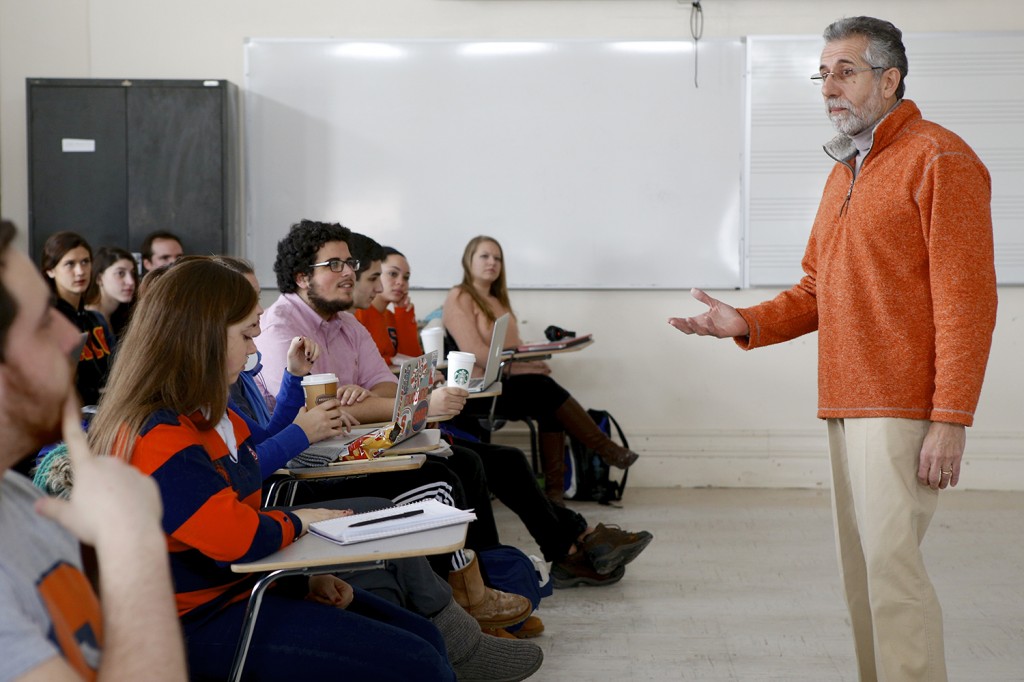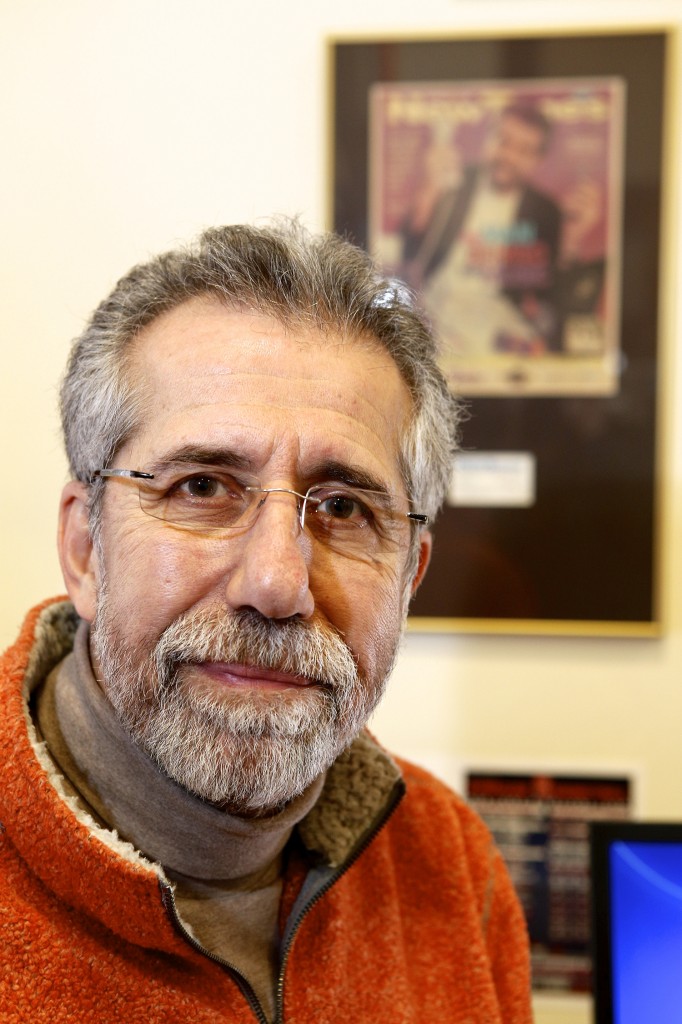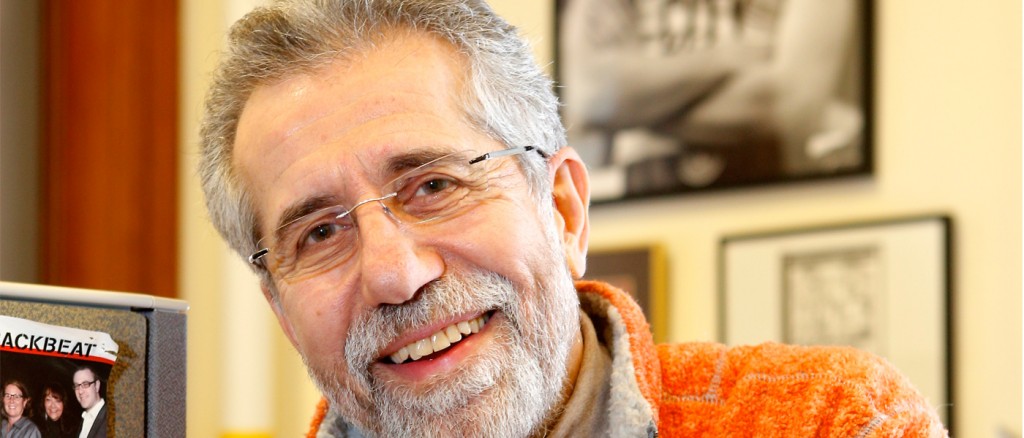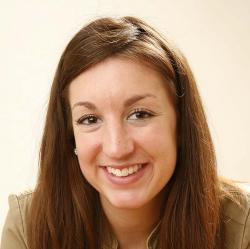On Thursday, March 5, Upstairs and the Dinosaur Bar-B-Que, the Syracuse Area Music Awards (Sammys) will host its annual Hall of Fame ceremony, featuring inductees Bobby Comstock, Chris Goss, Loren Barrigar, The Works and Phish’s Jon Fishman.
The Music Educator award will go to David Rezak, professor of practice of music at Syracuse University‘s Setnor School of Music. (Rezak also received a previous Hall of Fame honor in 1999.) The funny part for Rezak is that he says he’s not a music teacher.
“I’m in the group with people I revere,” Rezak says. “People like Joe Riposo. He’s a genuine artist and great teacher, probably the best, according to students, the best improv teacher in the world. I make it clear that I teach music business. It’s a different thing.”
That doesn’t mean it’s less important, Rezak affirms. “That is a message I really want to get across,” he says. “All musicians, no matter who they are, if they want to work as musicians, they are entrepreneurs. That’s the same for the lady who is the cellist in the symphony and Bono or Lady Bey.”
Rezak, who began his career right here in Syracuse, knows that better than anyone. His business, DMR Booking Agency, was behind many bands locally for decades. He was responsible for bringing major acts to Syracuse, managing local groups and helped develop the Bandier Program at SU, which boasts a 90 percent placement rate.
Still, he’s ever modest and fiercely proud of the students he’s seen accomplish great things. He boasts, “My students are just killing it out there.”

Michael Davis Photo | Syracuse New Times
If you love music so much, why don’t you play?
I took lessons when I was a child and I wasn’t very good. It didn’t mean I didn’t love it. I grew up in the 1960s when it was a special time to be a music fan. But I ended up lending some money to some friends who I thought had a great band (named Oats). I helped them buy some equipment as a loan and something was wrong. They were a good band and should have been able to get jobs, but they weren’t. So I started getting them jobs. And started getting other bands jobs. Before I knew it, I was an agent.
When was this?
I was managing them in 1969, but I didn’t classify myself as an agent until the fall of 1973. I wasn’t very creative with the name (DMR Booking Agency, after his initials).
What was it like booking music back then?
One of my friends said, “Wasn’t it great when things just sucked?” What he’s saying is that we didn’t realize how good we had it. The 1970s really were the golden age of rock’n’roll. We had this remarkable run. We began to make money. People were really coming out for live music, even on off days.
What were some of your favorite acts that you brought through in that time?
I was booking The Brookside in DeWitt when I discovered Syracuse was a blues town. I brought John Lee Hooker, James Cotton, Freddie King, all my favorites. Freddie King, what a great guy: He was awesome. And I don’t want to come off like. . . I didn’t create the blues scene in Syracuse, but I did discover the depth of passion for it as an agent. I’m just proud we were able to bring those names into an intimate setting. They’d play for four or five hours. Incredible stamina and the crowd was so appreciative.
Where did local acts fit in?
I started with local acts. I could give them a platform, to be an opening act and expose them. And it must be said, Jack Belle was my mentor. We shared offices. He was a real character. Talk about a gambler and a brilliant promoter. He put Fleetwood Mac in the Landmark (Theatre, then known as Loew’s State) in 1971 or 1972. He was mine and (fellow promoter) Chuck Chao’s mentor, a huge influence.
How did you get started at SU?
They launched a music industry program in the 1970s, a great program. One of the early directors asked me to become an adviser to the program. I was 30 years old and thought I knew everything. But it was in 1995 that Mike Greenstein (then editor-in-chief at the Syracuse New Times) decided to stop adjunct teaching and I was invited on board to teach his class: music industry and the media. I was always the guy plugging stories to The New Times because bands needed coverage, so it worked.

Michael Davis Photo | Syracuse New Times
You helped develop the Bandier Program, which includes teaching of music, business, media, marketing and entrepreneurship. Where did the idea for the program come from?|
After a year or so of teaching, I thought that the internships were great, but we needed some other hands-on experience for the students. Why not start a record label? I was told it was a great idea, but there was no way I’d sell it to the deal (DEAN???). But I was a booking agent and salesman of the music industry, so I talked to the director of the Setnor School of Music about it and we were given some money for the first record.
The program has had incredible success, with students getting very influential jobs. Why do you think the program works?
It’s built around the 360 model. We’re not just in the business of selling music now, not just a record label. They’re little 360 companies. Classes are small, 10 or 12, not 20. We got a second teacher, Bob Halligan (who also leads the Celtic band Ceili Rain), after he moved back from Nashville. Bob is a great artist-entrepreneur: He’s the most published living composer from Syracuse and a great communicator. He’s also a fantastic songwriter, so we set it up that Bob would teach a songwriting seminar here.
When was the program officially named and started?
We named the program in 2004, announced and built it and graduated a class in the fall of 2007. We’ve since launched a graduate audio arts program. We’ve got seven students in that.
What else is happening with the program today?
SU has two labels: Syracuse University Recordings and Marshall Street Records. They’ve got bank accounts and are self-sustaining for 18 years (since 1997). We began to see good learning outcomes early. Students would say, ‘This is helpful to me out in the world. I used what I learned in that.’ So, we thought that was successful.
What about the weekly Soyars Lecture Series you started in 2004?
As a teacher, you never stop learning. If you stop learning, you shouldn’t be teaching. The business is such an evolving landscape. It’s picking up all the time. I read the trades and talk the talk with students and industry friends, but with this weekly lecture series here, that’s how I keep informed, too. We’re constantly learning through that osmosis. We’ve had the founder of MTV, the biggest agent in the world, managers at Columbia and Epic Records, musicians. And our community of experts is so giving.
(The Setnor School of Music’s Soyars Lecture Series takes place every Tuesday, 6:30 to 7:50 p.m., is open to the public. For more information, visit vpa.syr.edu.)
What do you think of students today?
Students are so active and into everything. They are so full of curiosity and inventive spirit. It’s like nothing I’ve seen before. Phenomenal. They’re so fun to work with: enthusiastic, brilliant and well-informed. They’re remarkable.
You’ve been teaching in a variety of formats for a long time. What makes a great teacher?
When I got here, I needed to learn about music publishing. The live music piece (of the puzzle), I got. But publishing was a deficiency I had. A good educator better be a good listener and better know what they don’t know.
SAMMY Details
The Sammys Hall of Fame Induction Ceremony, taking place Thursday, March 5, at Upstairs at the Dinosaur Bar-B-Que, 246 W. Willow St., is sold out.
The Sammys Awards Show, featuring performances from Joanne Shenandoah, Scars N Stripes, Ruddy Well Band, Grupo Pagan and a reunion of The Works, takes place Friday, March 6, 7 p.m., at Eastwood’s Palace Theater, 2384 James St. Tickets are $20 and available at Syracuseareamusicawards.com. This year 57 nominees are up for awards in 13 categories:
Best Pop: Ceili Rain; Nick & Noah; Sir Magnus
Best Country: Hattie Lewis Band; Mick Fury & Midnight Moonshine; Jason Kreuger; Megan Lee; Driftwater
Best Jazz: Julia Goodwin; Nick Ziobro; Christiane Page; Bob Holz Band; Scott Dennis
Best Hip Hop: Oxburg; Nick Case a.k.a. Decoy; Supa Satty; Coke Da Don; Shystee
Best Blues: Tas Cru; Tangled Roots; Funky Blu Roots; Johnny Ray & The Stonethrowers; Castle Creek
Best R&B: Brownskin Band; Shakeif
Best Americana: Jeffrey Pepper Rodgers; The Brothers MacRae; Larry Hoyt & the Good Acoustics; String Bee
Best Alternative: Leah Shenandoah; The Overnighters; Phoenix Eleven; Phantom Chemistry; Joe Valentine
Best Rock: Ben Mauro; The FabCats; Golden Novak Band; William Gruff; The Unknown Woodsmen
Best Hard Rock: Jeremiah’s Razor; Nineball; How to Disappear Completely; Armed With Valor; Vampire Choir
Best Other Style: Doolin O’Dey; Samba Laranja; Peter Lavine
Best Jam Band: Joe Driscoll & Sekou Kouyate; Liquid Lounge Band; Acadia; Our Friends Band; Count Blastula
Best Singer-Songwriter: Tim Herron; Alanna-Marie Boudreau; Rabbit in the Rye; Kingsley Malcolm; William James Nicholson
Plus, the People’s Choice Awards for local artist or band, venue and music festival or series and the Brian Bourke Award for best new artist.





